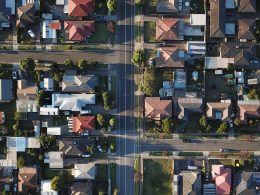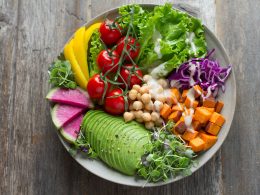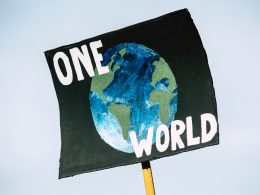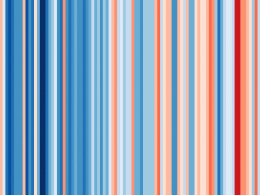Many of us remember the public outcry that occurred when it became known that Cadbury were going to put Palm oil in their dairy milk chocolate.
Facebook groups were started. Petitions were signed. Products were boycotted. And rightly so. The palm oil industry is associated with a vast array of negative wordly impacts. Most noticeably, deforestation.
In Indonesia where rainforests are cleared to make way for industrial palm oil plantations, deforestation is responsible for 80% of the whole country’s CO2 emissions. This made Indonesia at one point the world’s third-largest emitter of greenhouse gases (according to Greenpeace).
But it turns out that despite all that consternation, New Zealand still imports an estimated 2 million tonnes of Palm Kernel Extract every year. More than any other country in the world.
Palm Kernel Extract (PKE or Palm Kernel Expeller) is a by-product of Palm oil production. 2 million tonnes works out to approximately 391 kg each, for every single person in the country.
Audio version:
What do we do with all this palm kernel extract?
We feed it to cows.
See this description from DairyNZ:
“It (Palm Kernel Extract) is a dry, gritty meal with a soapy smell and has low palatability until cows get a taste for it.”
Sounds delightful.
It was 2.2 million tonnes back in 2018 until penalties were introduced for farmers who fed their cows excessive quantities. But although import levels have dropped, 2 million tonnes is still a crap tonne of palm kernel extract.
Palm kernel became popular in 2007 when a drought sent North Island farmers looking for new feed sources. Imports of palm kernel, a byproduct of the palm oil industry, went from 96,000 tonnes in 2003 to a record 2 million tonnes by 2014 and have stayed high ever since.
And it’s not like we take it off their hands for free. New Zealand farmers are spending $672 million a year on this stuff.
Australia, by comparison, imports 25k tonnes per year. Yes, that’s right, we import 80 times more Palm Kernel Extract than our nearest neighbour.
The chart below shows the estimated amount of palm kernel meal imported by NZ compared to other countries (2021). We import more PKE than the entire European Union.
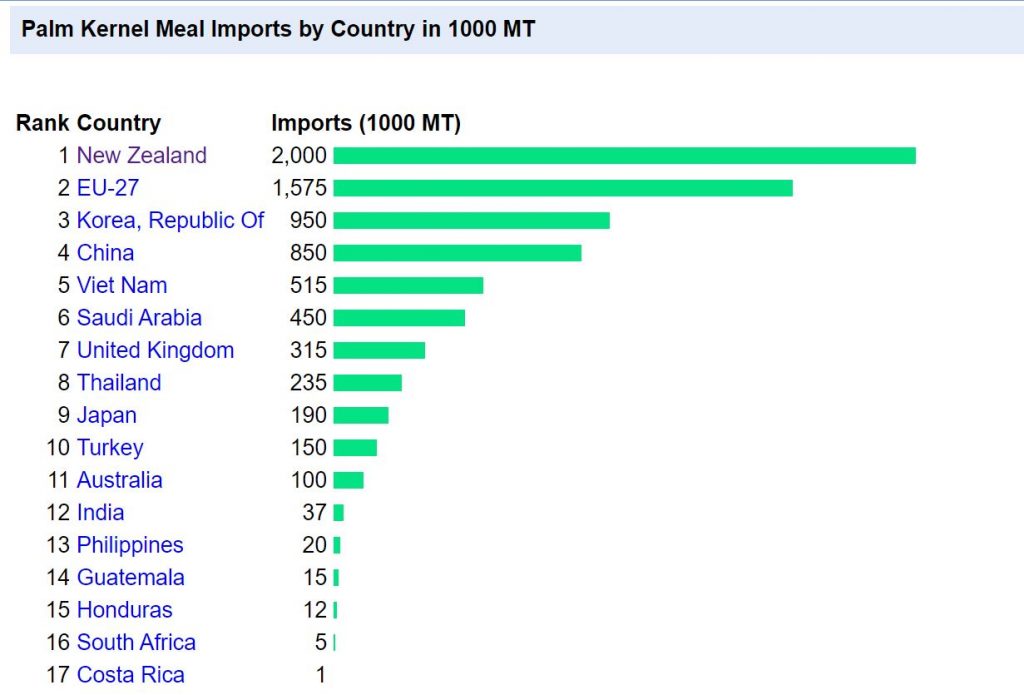
We import more than twice as much palm kernel extract as China, India and Australia combined. And those countries have a combined 63.5 million dairy cows (we have 6.1 million).
To give you an example of what this much PKE (Palm Kernel Extract) actually looks like, consider bananas.
New Zealand imports more bananas per capita than any other developed country – 72 million kilograms a year, according to the UN Food and Agriculture Organisation.
Sounds like a lot, right?
72 million kg is 72,000 tonnes. That’s around 14.4 kg of bananas per person, per year. At the same time, we imported 1.825 million tonnes of palm kernel extract into NZ back in 2020. That’s 25 x the amount of bananas we imported (by weight).
Why do we use Palm Kernel Extract?
Basically, it appears to come down to demand and supply. We have a lot of cows in NZ, so many that we run out of grass every year and need supplemental feed to get through each winter.
We make around 400k tonnes of wheat each year and the vast majority of this (approximately 80%) is feed to cows. While we are the best wheat growers on the planet, we still don’t grow enough to feed our massive dairy industry.
As a resulting side-effect, three-quarters of the bread sold in New Zealand is made from grain grown overseas, primarily Australia.
Hence the need for palm kernel meal. Prices are well hidden for this controversial product. But one website showed palm kernel meal at $590 per tonne, versus maize at $965 per tonne and wheat at $1,042 per tonne.
So this cheap, imported supplementary feed appears to be supporting the profitability of our massive dairy industry.
Removing this feed from our supply chain would help incentivise kiwi farmers to grow more wheat right here in New Zealand.
That, or we could just have a few less cows.
What can I do about this?
Action step 1: Greenpeace has an online petition to phase out imported animal feed that has gained serious traction on this issue. You can add your voice here:
https://petition.act.greenpeace.org.nz/imported-feed?source=actioncallout
Action step 2: You can read more about NZ dairy’s link to the palm industry on the Greenpeace website:
Or check out ‘What is wrong with Palm Kernel’ on the Freshwater for life website.
Action step 3: Reduce your intake of dairy products. While most of our dairy is sold to China, your personal, consumer choices still matter. You can decide whether to purchase dairy and continue to subsidise this import activity or switch to alternatives with lower environmental impacts.
Action step 4: Share this story with others.
Photo by Nazarizal Mohammad on Unsplash






